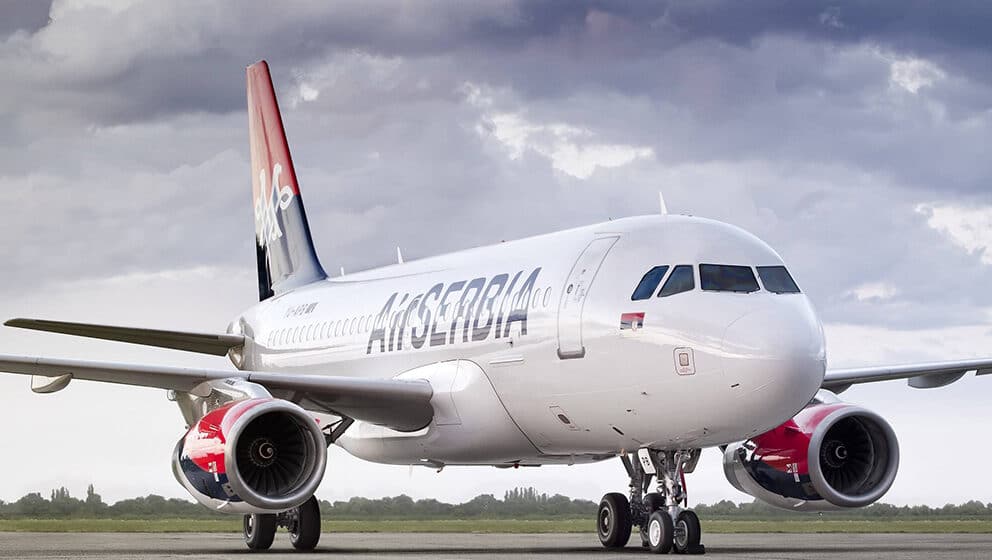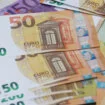 Foto: BETAPHOTO/Air Serbia/Dušan Atlagić/DS
Foto: BETAPHOTO/Air Serbia/Dušan Atlagić/DSOdmah nakon što je prestolonaslednik Ujedinjenih Arapskih Emirata, šeik Muhamed bin Zajed za gotovo upola cene dobio hotel na Kopaoniku, dok se za srpsku stranu ne zna da li je i čime nagrađena, usledio je prvi ozbiljniji posao sa arapskim partnerima – privatizacija Jat ervejza.
For English version, please scroll down
Za partnera koji bi trebalo da podigne domaću avio-kompaniju već utonulu u dugove, izabran je Etihad koji je upravo tada gradio novu poslovnu strategiju čija je osnova bila okupljanje manjih kompanija.
U startu se postavljalo pitanje koliko je to dobar posao.
Naime, za 51 odsto udela u novoosnovanoj Er Srbiji iz budžeta je izdvojeno 90 miliona dolara uz obavezu da će biti namireni prethodni dugovi Jata od 237,7 miliona dolara.
Od tog iznosa, odmah je otpisano više od 137 miliona dolara obaveza prema državnim firmama i institucijama.
Takođe, iz državne kase planirano je da se u naredne tri godine izdvoji još 326 miliona dolara kao pomoć firmi da započne uspešan prodor.
Etihad je, umesto direktnog ulaganja, pozajmio Er Srbiji 40 miliona dolara koje je kasnije konvertovao u svoj udeo – 49 odsto.
Pri tom, ugovorima koji nikada nisu objavljeni, osim nekih delova u čiju se originalnost sumnja, predviđeno je da Etihad postavi kompletan menadžment, čije su plate, određene prema standardima u Abu Dabiju, fakturisane Er Srbiji a refundirala ih je Vlada Srbije.
Sve odluke donosilo je tako oformljeno rukovodstvo bez ikakvog uticaja srpske Vlade ili domaćih stručnjaka.
Problematičan je bio i način širenja flote Er Srbije, koja se očekivala od Etihada, jer su umesto novih aviona, iznajmljena dva stara Erbasova koji su potom dati u podzakup domaćoj avio-kompaniji po ceni koja je bila tri puta veća nego što je za nju platio arapski partner.
Poseban udar na poslovanje tako privatizovane kompanije bila su dva kredita koja je 2015. i 2016. odobrio Etihad – jedan od 56,5 drugi 63 miliona dolara, sa izuzetno visokom kamatom od 6,55 odsto i troškovima obrade teškim po čak 7,5 miliona evra.
Poređenja radi, u tom periodu krediti su se na finansijskom tržištu mogli naći sa prinosom i manjim od 2,5 odsto.
Samo na ime kamate po svakom kreditu dug prema Etihadu uvećan je za 20 odnosno 23 miliona dolara.
Država se nadala da će otplatu tih kredita, dospelih u junu prošle i maju ove godine olakšati Etihad kao suvlasnik, ali predlog da zbog teškoća poslovanja izazvanih pandemijom otpiše 82 odsto duga, jednostavno je odbijen.
Praktično, Etihad se povlači iz posla sa Srbijom.
Vlada je 30. decembra prošle godine uplatila 100 miliona evra u zamenu za njihovih 31 odsto akcija tako da je sada struktura promenjena, pa država ima 82 odsto, a arapska kompanija 18.
Na čelu Er Srbije i dalje je Britanac Dankan Nejsmit, pomaže mu Branislav Malović dok su u Nadzornom odboru četiri člana koje je imenovao Etihad a pet je dala Vlada Srbije, među njima je i savetnica za medije predsednika Srbije, Suzana Vasiljević.
Inače, Nejsmit je na čelu Er Srbije zamenio Daneta Kontića, koji je baš u vreme kada je grupacija Etihad zabeležila minus od dve milijarde dolara, jednostavno „nestao“.
Novi direktor je pre ove funkcije bio finansijski rukovodilac Al Italije, koja je bankrotirala nakon što je pravila dnevno gubitak od milion dolara.
– Suština problema je to što je Etihad pokušao da napravi model koji Svis erlajnsu nije uspeo krajem prošlog milenijuma. I oni su pokušali da investiraju u manje kompanije koje su bile pred bankrotom, verujući da će moći da ih podignu, ali je grupacija posle nekoliko godina bankrotirala. Etihad je mislio da će u tome uspeti iz dva razloga. Prvo, jer su „vlasnici bunara nafte“ imali dosta para, a drugo, od tri vodeće kompanije iz tog dela sveta Etihad je bio najmanji, bitno je zaostajao i verovao je da će okupljanjem manjih prevoznika uspeti da popravi svoju poziciju. Cela je grupacija, međutim, propala. Etihad je neko vreme skrivao svoje finansijske podatke, falsifikovao je činjenicu da je zbog tih kompanija bio u ozbiljnim gubicima a 2017. čak pred bankrotom. Sada govorimo o minusu od 2,5 milijarde dolara a jedna milijarda gubitka u vazdušnom saobraćaju je novac koji kompanije ne mogu vratiti – kaže za Danas Alen Šćuric, vlasnik i urednik regionalnog avio portala Zamaaero, koji dodaje da se Etihadu, na kraju priče, nagomilao gubitak od pet milijardi dolara pa je još uvek pred bankrotom.
Naglašava da su potpuno promenili politiku, postali su jedna mala i nebitna azijska kompanija, rešili su se svih pridruženih prevoznika koji su ili prodati poput Virdžin atlantika ili su bankrotirali kao Al Italija, Džet, Darvin, dok je pitanje dana kada će se to desiti i Er Sejšelsu. Da država nije ubacila 240 miliona evra, bankrotirala bi i srpska nacionalna kompanija, tvrdi Šćuric.
– Srbija je mogla da izabere i drugi put. Da je tako veliki novac uložila u Jat, od te kompanije se moglo nešto napraviti, ali pod uslovom da nemate nepotizam, ne uhlebljujete partijske ljude, ne zapošljavate preko mere i kadrove koji posle loše upravljaju novcem, razbacuje se, krade. U Evropi imate kompanije koje su se same pribrale, poljski Lot, pa Baltik, „upucali“ su neki novac, ne veliki, ali su doveli novi menadžment koji je iz korena promenio poslovanje – navodi naš sagovornik.
Kaže kako se boji da u Srbiji bez „tutora“ to nije bilo moguće a da li se dobilo ili izgubilo druga je priča.
– Etihad je prilično izmuzao Er Srbiju. Uzeo je stravičan novac i to ne samo zbog kredita koji su bili abnormalno loši, niti zbog novca koji je trebalo da vrati jer je vlasništvo stekao pozajmicom a ne investicijom, nego i zbog činjenice da su se bitno skuplje iznajmljivali avioni za Er Srbiju, da su se školovali ljudi po jako visokim cenama u Abu Dabiju, da se promenila flota što je ozbiljan izdatak, da su se radili neki zajednički projekti tipa kol centri gde se brinulo samo o Etihadu, da su neke službe otišle u Abu Dabi, izgubila ih je Er Srbija i kasnije je trebalo je jako puno energije i sposobnosti da se to vrati u Beograd. Da je Jat sam ušao u taj posao danas bi bio u mnogo boljem stanju, manje bi se novca izgubilo, imao bi više za razvoj. Mislim da je ta svota, a govorimo o oko 700 miliona evra koliko je Srbija uložila u projekat sa Etihadom, morala doneti daleko veće benefite – zaključuje Scuric.
Nekadašnji direktor Jat ervejza, Predrag Vujović, kaže za Danas da je čitav taj koncept privatizacije bio pogrešan jer je u startu vrlo grubo eliminisano znanje domaćih stručnjaka koji su se u nacionalnom avio-prevozniku gradili pet decenija. To se odnosi ne samo na premise u uspostavljanju partnerskog odnosa, nego i na druge aspekte poslovanja, nabavke aviona, definisanje linija, tarife…
– Taj posao bio je uvod u arapske investicije, pre svega Beograda na vodi, da se vidi reakcija. Prednost je data menadžmentu firme koja je poslovala u avio-prevozu tek sedam godina i gubitak se beleži od prvog dana. Kada najprofitabilnije linije, koje je Jat imao ranije, nisu uključene u Er Srbiju, onda to ne može da uspe. Posledica je zvanično 72 miliona dolara gubitka u prošloj godini a kumulativno, što niko ne zna bez uvida u podatke kompanije, pominje se od pola milijarde do 800 miliona. Tačan iznos ne može da se utvrdi, ali evidentno je da na godišnjem nivou minus iznosi između 50 i 70 miliona – kaže Vujević i pita zašto se sada, kad Etihad odlazi, ne objave ugovori koje je Vlada sa njim sklopila.
Teška računica
Koliko je tačno koštalo partnerstvo sa Etihadom, nemoguće je izračunati jer su neki izdaci iz državne kase zamaskirani kao otplata ranijih obaveza, nešto je dato po konkursu za subvencionisane linije, deo se odliva kao refundiranje troškova za plate menadžmentu, ne zna se koliko košta povlašćena pozicija na beogradskom aerodromu, niti nadoknada za gorivo koju delom pokriva Vlada. Ono što se zna, jeste da je osim 90 miliona dolara datih za većinski udeo u Er Srbiji, država izdvojila i 93,2 miliona za otpremnine zaposlenima koji su proglašeni za višak u Jat ervejzu i Jat keteringu, izmiren je dug od 13 miliona dolara Aerodromu, 23,5 miliona dolara dato je za restrukturiranje kompanije i 40,2 dolara miliona za delimično pokriće drugih gubitaka. Vlada se, osim toga, obavezala i da do 2016. uloži još 326 miliona evra za bolje pozicioniranje nove avio-kompanije, pri čemu sve ove uplate nisu imale uticaja na vlasničku strukturu. Obaveza Etihada bila je da u istom periodu uplati 60 miliona dolara.
* Sadržaj je rezultat istraživanja sprovedenog u okviru projekta „Transparentnost učešća države u stranim investicionim projektima“. Stavovi izneti u tekstu su stavovi autora i ne izražavaju nužno stavove donatora.
ENGLISH VERSION
How Etihad Drained Air Serbia Dry
Immediately after the heir to the throne of the United Arab Emirates, Sheikh Mohammed bin Zayed, had been given a hotel on Kopaonik for almost half the price, while it has remained unclear if and how the Serbian side was rewarded for such a gift, the first major deal with UAE partners followed – privatization of JAT Airways.
Etihad was chosen as the partner that should revitalize the domestic airline, which had already been struggling with debt, and it was then that Etihad built a new business strategy based on the acquisition and grouping of a number of smaller airlines.
From the very beginning, the question was how good a deal it was. Namely, for the 51 percent share in the newly established Air Serbia, 90 million dollars were allocated from the budget, with the obligation that the previous debts of Jat Airways of 237.7 million dollars will be settled.
Of that amount, more than 137 million liabilities to state-owned companies and institutions were immediately written off. It was also planned to allocate another 326 million dollars from the state treasury in the following three years to help the company start a successful market penetration.
Instead of a direct investment, Etihad lent Air Serbia 40 million dollars, which it later converted into its share – 49 percent. The contracts, which were never published, except for some parts with questionable authenticity, stipulate that Etihad would set up a complete management, whose salaries, determined according to the standards in Abu Dhabi, were invoiced to Air Serbia and refunded by the Serbian government. All decisions were made by the newly formed leadership and without any influence from the Government of Serbia or domestic experts.
The way the Air Serbia fleet was expanded, which was one Etihad’s obligations, was also problematic, because instead of new planes, two old Airbus aircraft were leased and then subleased to the Serbian airline at a price three times higher than what the UAE partner had paid for it.
A special blow to the business of such a privatized company were two loans approved by Etihad in 2015 and 2016 – one of 56.5 and another 63 million dollars, with an enormously high interest rate of 6.55 percent and processing costs of 7.5 million euros each.
For the sake of comparison, in that period, loans could be found on the financial market with a yield of less than 2.5 percent. Only on the basis of interest for the two loans, the debt to Etihad was increased by 20 and 23 million dollars, respectively.
The state hoped that the repayment of these loans, due in June last year and May this year, would be facilitated by Etihad as a co-owner, but the Serbian government proposal to write off 82% of the debt due to business difficulties caused by the pandemic was bluntly rejected.
Practically, Etihad is withdrawing from the deal with Serbia. On December 30 2020, the government paid 100 million euros in exchange for their 31 percent of shares, resulting in the change of the ownership structure, as the state now owns 82 percent, while the UAE company has 18 percent.
Air Serbia is still headed by Briton Duncan Naysmith, assisted by Branislav Malović, while there are four members on the Supervisory Board appointed by the Etihad and five by the Government of Serbia, among them is the media advisor to the President of Serbia, Suzana Vasiljević.
Naysmith replaced Dane Kontić at the CEO of Air Serbia, who just „vanished into thin air“ at the time when the Etihad Group recorded a deficit of two billion dollars. Prior to this position, the new CEO was the chief financial officer of Al Italia, which went bankrupt after making a daily loss of one million dollars.
– The essence of the problem is that Etihad tried to employ the same model that had been tried and proven unsuccessful by Swiss Airlines at the end of the last millennium. They also tried to invest in smaller companies that were on the verge of bankruptcy, believing that they would be able to breathe new life into them, but the group went bankrupt after a few years. Etihad thought they would succeed in this for two reasons. First, because the „oil wells owners“ had a lot of money, and second, of the three leading companies from that part of the world, Etihad was the smallest, lagging significantly behind, and believed that it would improve its position by bringing a number of smaller air carriers together. However, the whole Etihad Group failed. They hid its financial data for some time and falsified the fact that they had serious losses due to the flawed and unrealistic expansion. In 2017, Etihad was on the verge of bankruptcy. We are talking about a deficit of 2.5 billion dollars and, in air transport, a loss of one billion loss can never be returned – Alen Šćuric, owner and editor of the regional air portal Zamamaero, says for Danas and adds that Etihad has eventually accumulated a loss of five billion dollars and is still on the verge of bankruptcy.
He emphasizes that they have completely changed their policy, become a small and insignificant Asian company, and got rid of all associated carriers that were either sold, like Virgin Atlantic, or went bankrupt like Al Italia, Jet, and Darwin, while it is a matter of days when it will happen to Air Seychelles, too. If the state had not invested an additional 240 million euros, the Serbian national air carrier would have gone bankrupt, Šćuric claims.
– Serbia could have chosen another approach. If the state had invested so much money in JAT, something could have been made from that company, but under the condition there is no nepotism, that you do not use it to give jobs and sustain party members, do not employ excessively and do not employ incompetent personnel who later mismanage, waste, or steal the company’s money. In Europe, you have companies that have recovered this way, e.g. Polish LOT, and then Baltic, they had some money – and these were not large amounts – invested by the state, but they brought a new management that radically changed the business – our interlocutor says.
He notes that he is afraid that, in Serbia, this was not possible without a “tutor”, and whether Serbia has gained anything or suffered an enormous loss in this deal is another story.
– Etihad pretty much drained Air Serbia dry. They took outrageous amounts money, not only on the basis of the loans that were abnormally unfavorable, not only because they should have repaid the money for the share in the company which was acquired through a loan and not through a direct investment, but also because of the fact that the aircraft leased for Air Serbia were significantly more expensive, the crews were educated in Abu Dhabi at outrageously high prices, and the whole fleet was changed, which is a serious expense. Furthermore, the way joint projects, such as call centers, were done served the Etihad needs and interests only, and the Air Serbia lost a number of services, which had been transferred to Abu Dhabi, and later needed a lot of energy and resources to return them to Belgrade. If JAT had made this deal on its own, it would have been in a much better shape today, less money would have been lost, and more would have been invested in tangible development. I think that the amount, and we are talking about about 700 million euros, that Serbia invested in the project with Etihad, must have brought far greater benefits – Šćuric concludes.
Former JAT Airways CEO, Predrag Vujović, says for Danas that the whole concept of privatization was flawed because the knowledge of domestic experts who had been building the national airline for five decades was brutally eliminated from the very start. This refers not only to the premises in establishing a partnership, but also to other aspects of business, procurement of aircraft, definition of routes, tariffs…
– This deal was an introduction to the heftier UAE investments, primarily the Belgrade Waterfront project, to test the reaction of the Serbian public. Preference was given to the management of the company that had operated in air transport for seven years only, with the loss being recorded from the very first day. When the new management in Air Serbia decided to give up on the most profitable routes, which JAT had operated before, then this whole deal was simply doomed from the very start. The consequence is an official $ 72 million loss last year, and the cumulative loss, while it is impossible to know exact figures without access to the company’s data, is estimated at half a billion to $ 800 million. The exact amount cannot be determined, but it is evident that the annual loss is between 50 and 70 million – Vujević says and asks why now, with Etihad leaving, the agreements that the Government signed with them are not made public.
A Tangled Reckoning
It is impossible to calculate exactly how much the partnership with Etihad cost because some expenses from the national treasury were disguised as repayment of previous obligations, something was given on the basis of competitions for subsidized lines, a part was poured in as a refund for management salaries. Furthermore, it is not known how much the privileged position at the Belgrade Airport costs, nor compensation for the fuel, which is partially covered by the government. What is known is that, in addition to the $ 90 million given for the majority share in Air Serbia, the state also set aside $ 93.2 million for severance pay to employees who were declared redundant in Jat Airways and Jat Catering, and a debt of $ 13 million was paid to the Airport, $ 23.5 million was given to restructure the company and $ 40.2 million to cover partially other losses. In addition, the government committed to invest another 326 million euros by 2016 to position the new airline in the market, with all these payments not having any impact on the ownership structure. Etihad’s obligation was to pay 60 million dollars in the same period.
The content is the result of the research carried out within the project „Transparency of State Participation in Foreign Investment Projects“. The views expressed in the text are those of the authors and do not necessarily reflect the views of the donor.
Pratite nas na našoj Facebook i Instagram stranici, ali i na X nalogu. Pretplatite se na PDF izdanje lista Danas.











